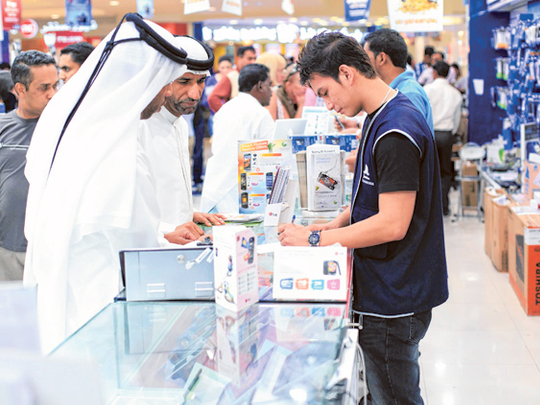
Dubai: The shades of grey that have been a feature of Dubai’s tech marketplace are changing colour. Grey market activity on high-end smartphones and tablets has come down appreciably as the combined efforts of global vendors and leading local distributors and retail chains start to yield results.
This has come about through closing the time gap between a new smartphone’s global launch and its introduction here. Not just that, some vendors are even going for simultaneous launches, as has happened with the UAE being a launch market along with a handful of other hubs for the rollout of the Samsung Galaxy S3 and, just recently, Blackberry’s with Z10.
“The grey market has also been held back when they’ve not had access to stock at launch — for example, Galaxy S3 and Z10 were available with the official channels well before the grey channel could get their hands on them,” said Ashish Panjabi, chief operating officer at Jacky’s Group.
Earlier, there used to be a one- to two-month gap on average before a latest model would be available in sufficient volumes through the official channels here. The gap would even widen if a model turned out to be a global hit, which would result in the vendor having supply issues.
This was the period that grey market importers would exploit to the hilt and at highly inflated prices. There was a period when the grey market almost exclusively tuned on Apple’s US launches of the iPhones and iPads.
Even that is under threat now. “If I take the example of Apple, most retailers including ourselves are now official resellers for Apple since Apple worked hard to bring down the difference in pricing between markets like the UAE and Singapore to the point that we are at times cheaper than Singapore,” said Panjabi.
“Furthermore, the availability of Apple products has improved significantly through the official channel, meaning consumers are willing to wait a few weeks for the product to come here at a reasonable price instead of the exorbitant prices from the grey market. Grey thrives when there is a big delta in pricing or when goods aren’t available through official channels locally.”
Niranjan Gidwani, deputy CEO at Eros Group, sees the grey market losing in significance, but not to the extent that it will be wiped off. “Vendors have been working to unify their prices across all territories for some time now, but something or the other always happens that is totally out of their control,” said Gidwani.
“Recently, the European crisis led to inventory stockpiles at their end, and earlier there was the Arab Spring and the sanctions on Iran. When the channels see a build-up in unsold inventory they will obviously look to offload it in markets where there is growth. Obviously this will create price discrepancies and there will always be a lag before official prices fall in line.
“There is nothing much a vendor or official distributor can do under such circumstances.”
That leaves enough wriggle room for grey market operators to survive on, but not enough to thrive.











